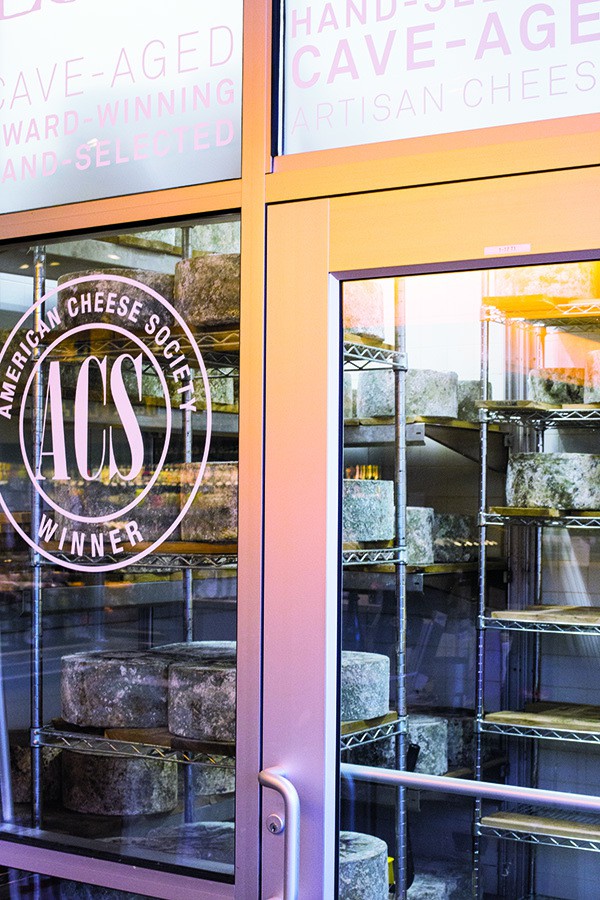
The classic image of affinage evokes cool subterranean caves lined with wooden shelves of slowly ripening, meticulously tended cheeses. But in the United States today, those who nurture wheels to their peak—affineurs—do it in glass-walled, temperature and humidity-controlled “caves” within view of suburban Chicago wine bar customers. Or in repurposed historic brewery tunnels in Brooklyn; state-of-the-art vaults constructed in the Vermont countryside; or a supermarket-owned 12,300-square-foot building near Rochester, New York.
In Europe, young or “green” cheeses have long been purchased from makers and ripened under the supervision of expert affineurs in a central cave system. “People are brought up in the profession, learning the art of aging cheese, of bringing it to perfect ripeness,” says Janet Fletcher, a San Francisco–based writer and publisher of the blog Planet Cheese. Traditionally, explains Laure Dubouloz, general manager of the US division of Mons Fromager-Affineur, affinage is a role distinct from cheesemaking. “Those are two full-time jobs,” she says. As affineurs, she continues, “we start with the work of the cheesemaker, which we have to respect and take on the aging and marketing of their cheese. I don’t think it’s rocket science, but you do need to know the rules. It’s a whole ecosystem.”
The steady growth of domestic artisan cheese has driven American awareness and practice of affinage. Expertise has been either imported or homegrown with input from the European tradition. Business models include contract affinage, in which cheesemakers pay for the service; consolidators who also handle sales, marketing, and distribution for small cheesemakers; and retailers with their own in-house programs.
Across the range, the benefits are clear. At Boston restaurant L’Espalier, long lauded for its impeccable cheese cart, manager Louis Risoli says that cheeses arrive these days in better shape than ever before. “It has just added a whole layer of sophistication and taste,” Risoli says.

The glass-walled aging caves at Standard Market. Photo Courtesy: Standard Market
Beyond the gustatory rewards, affinage delivers many advantages for retailers and cheesemakers. A cheesemonger with an affinage program conveys to the ever more sophisticated consumer that they’re “going the extra mile,” observes Fletcher. New York-based Wegmans claims the first affinage facility owned and operated by a supermarket chain. Cheese production specialist Mathieu Callol came on board from his native France last year to continue building the program, which boasts eight rooms, each for different types of cheese. Both imported and domestic cheeses benefit from the care, Callol says, before they are shipped to the chain’s cheese counters throughout the Northeast and Mid-Atlantic.
At Standard Market, in the western suburbs of Chicago, head cheesemonger Alyssa Stone ages cheese for two retail locations as well as a pair of in-store wine, beer, and cheese bars. The 70-square-foot, glass-walled caves are built into the bars. “People can see us working in there. It starts conversations,” she says. Meticulous testing and documentation are critical both for food safety and for replicating success. Several of Standard Market’s regional collaborations have won awards, including a mixed-milk cheese made by Lovera’s in Oklahoma and a goat’s milk cheddar from Wisconsin’s LaClare Farms. Standard Market promotes cave-aged release events, and Stone emphasizes that no cheese is launched without the maker’s blessing.
Sequatchie Cove Creamery in Tennessee had sold their wheels to Standard Market for several years when Stone suggested an affinage partnership. Co-owners Padgett and Nathan Arnold jumped at the opportunity to learn and to deepen the relationship. On a practical level, Padgett notes, “We can send cheese out a little younger and [create more space] in our aging rooms.” It also improves cash flow: “There’s a long window between making cheese and the sale. Closing that gap is very helpful to our small business.”
Open and trusting relationships are key to successful affinage. Brooklyn’s Crown Finish Caves and Vermont’s Cellars at Jasper Hill are two larger-scale examples of American affinage, each aging thousands of pounds of cheese for a select set of cheesemakers. “We have to feel completely comfortable that they have really good practices on the farm and in the creamery,” says Zakia Babb, Crown Finish’s cave manager. In turn, both Babb and Jasper Hill’s Zoe Brickley stress how much care is taken with cheeses entrusted to them. The role of the affineur, Brickley summarizes, is “honoring the intent of the cheesemaker and the potential of the cheese. You can’t make a bad cheese better, but you can totally (screw) up a good one. It’s a lot of responsibility.”



